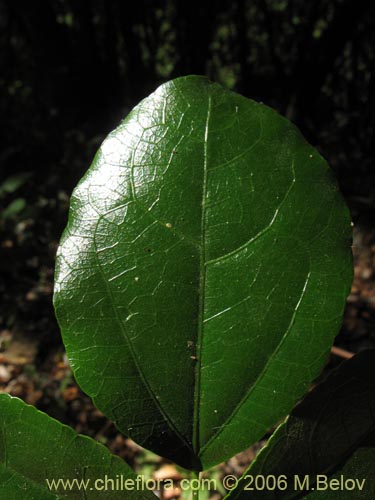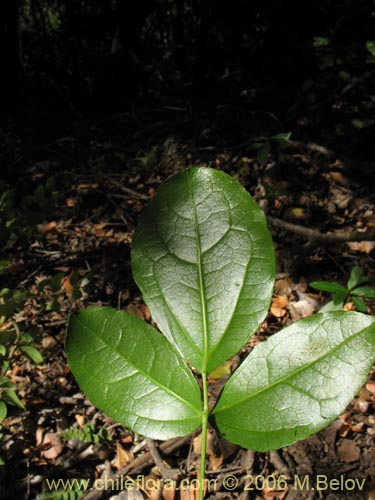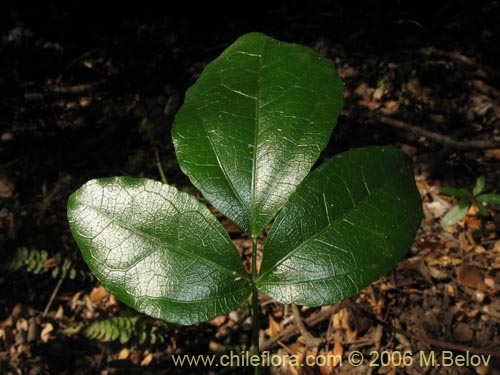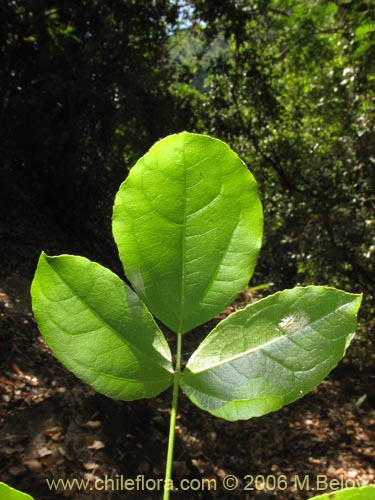|
|
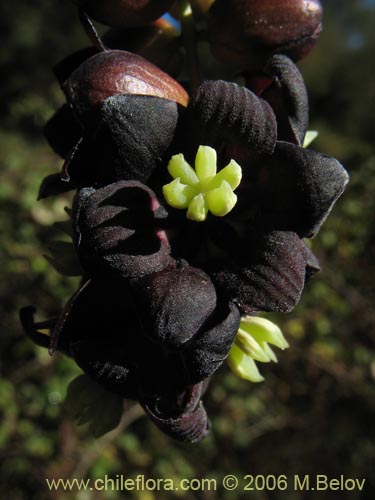
Lardizabala biternata의 사진
위치:VIII Region, Los Pellines, Shangri-La, Termas de Chillan, 칠레
해발:600-1500 미터르. 날짜:2006년 04월 08일.
|
|
|
당신은 이 페이지를 보기 위하여 다른언어를 사용할 수 있다: |
| 라틴어 이름: | Lardizabala biternata Ruiz & Pav. | |
| 과: | Lardizabalaceae, 으름덩굴과 | |
| 목: | Ranunculales | |
| 치레이름: | Cóguil , Voqui blanco , Voqui , Coguilera | |
| 영어이름: | Zabala Fruit | |
| 독일이름: | ||
| 러시아어이름: | ||
| 기록: | 0123 |
| 칠레에세 Lardizabala 종은 대략 1 있다. 우리의 데이타베이스에세 Lardizabala 종은 대략 1 있다. | |
| 칠레에서 Lardizabalaceae, 으름덩굴과과에 속하는종은 대략 2 있다. 우리의 데이타베이스에서 Lardizabalaceae, 으름덩굴과과에 속하는종은 대략 2 종이 있다. |
  |
|
|
|
|
| 칠레출생식물. 빈번하지않은 식물.
식물높이: 10 m. 극단적인장식성 (매우아름다운식물) (A+) |
|
|
소개 |
|
Lardizabala biternata의 사진 위치:VII Region, Radal Siete Tazas, 칠레
|
식물 묘사
식물형: 관목 꽃: 파란 색깔, 꽃잎 6장 식물높이: 10 m.
|
|
Lardizabala biternata의 사진 위치:VII Region, Radal Siete Tazas, 칠레
|
서식지치레에서 이식물종이 이런재배조건에서 살고있다:
해발에 따라 서식지: 중간 고각 (숲의 상단까지)
급수조건: 거의 일정한 강우와 더불어 다습한 지역. 짧은 건조한 기간은 가능하다 (일반적으로 1 달까지).
햇빛조건: 약한 그늘. 햇빛의 20 - 40%를 여과함. |
|
Lardizabala biternata의 사진 위치:VII Region, Radal Siete Tazas, 칠레
|
유용한특성극단적인장식성 (매우아름다운식물) (A+)
유용한특성: 식용 식물
|
|
Lardizabala biternata의 사진 위치:VII Region, Radal Siete Tazas, 칠레
|
경작(재배)에 관하여 조언추운기후에관한 이내성이 좋다. 식물은 - 8°C온도를 잘견뎌낼 수있고, 눈 몇일동안 (반달까지) 견뎌낼 수있다. 미 농무성 (USDA)의기후대 8.
씨앗의맹아 (萌芽)기능은 보통, 30% - 60 %.
It is somewhat easier to cultivate than Bell flower (Lapageria rosea), although their habitats are more or less similar. Lardizabala is somewhat more tolerant to sunlight and does not require such acid soil as Lapageria rosea. To obtain good results you need fresh seeds and cold stratification (soak the seeds for one day in water, then put them into wet sand and put them into refrigerator at about +2 +5º C for about 30 days. Allow the seeds to breathe (ventilate from time to time) and check the humidity of the sand (it tends to dry out quickly, so adding moisture every three-four days is a must) 당신이 이 식물또는 유사한 식물의씨는구매에 흥미있는 경우에 여기에서 들어 가십시오. |
|
Lardizabala biternata Ruiz & Pav. 식물의 사진은 더 여기에서 볼수있다.
|
|
여기서 당신은 우리의 데이타베이스에 있는 동일한Lardizabalaceae, 으름덩굴과과에게서 종을 더 볼 수 있다: Boquila trifoliolata (Voqui blanco / Pilpilvoqui) Lardizabala biternata (Cóguil / Voqui blanco / Voqui / Coguilera) |



